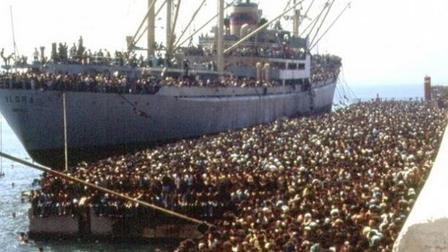The Human Cargo (2012)
La nave dolce (original title)
dir: Daniele Vicari

What would you do if 20,000 Albanians turned up on your doorstep? That is exactly what happened at the port of Bari, Italy on August 8th 1991. The myriad causes and consequences of this unique incident are the subject of Daniele Vicari’s remarkable film, which won the Best Documentary award at last year’s Venice Film Festival. Shown as part of the Lavazza Italian Film Festival 2013 in Melbourne, The Human Cargo uses the testimonies of the people who were onboard the ship Vlora over twenty years ago to tell its bizarre story – a story that captures the spirit of our human right to strive for a better life.
In 1991, the Communist People’s Socialist Republic of Albania was teetering on the brink of collapse and revolution. Years of isolation from the international arena had limited the country to only sporadic television broadcasts from Italy, however ridden with poverty, inhumane living conditions and harsh dictatorships it was clear to the people that a life in Italy was a better life than they could ever have in Albania. When the cargo ship Vlora returned from Cuba with 10,000 tons of sugar to unload in the town of Durazzo, a frenzied people took the opportunity of a lifetime. A froward horde of men, women and children seized the ship and demanded the crew deliver them to a new life in Italy. The footage of the ship, overflowing with people, crossing the Adriatic is interspersed with excited memoirs from those who recall their own personal experiences of the events. Vicari does an excellent job of weaving these insights together to present us with the hope and dreams that existed on the ship at the time. Nobody believed they were doing anything wrong; they never questioned their decision to leave their homes, in some cases their families, they were completely content and optimistic.
To the flabbergasted Italian faces that looked upon the ship at the port, hearing the cries of “Italia, Italia,” it was a breathtaking sight. As the ship undocks, utter hysteria unfolds as thousands of Albanians suffering from malnutrition, exhaustion and dehydration are treated like cattle in a pen by the clueless Italian authorities who lacked the resources and the leadership to deal with the masses of people. Eventually the decision is made to imprison them in the city stadium until they can deport them back to Albania.
The conditions on the ship must have been cramped and uncomfortable, but they were nothing compared to the hell that ensued within the stadium. As the Albanians hopes are slowly dashed by the scorching sun, police barricade the exits and the authorities airdrop food and water from above. Before long an anarchic, dystopian community forms within the stadium. Video footage shows thugs guarding all the resources in the middle of the field, a field now representing a war zone, along with random acts of wanton destruction and one gang driving dangerously around the stadium in a burnt out car. The documentary concludes with a montage of footage of sad, disheartened Albanians being herded into planes and boats back to their homeland. The dream was over.
The film’s title in Italian translates to “The Sweet Ship” but it is far from a sweet tale. Vicari’s effective use of archival footage and first-hand testimonies, including those from the ship’s captain Halim Milaqi and two of Albania’s popular artists – the filmmaker Robert Budina and the dancer Kledi Kadiu, is the documentary’s strength and provides a number of astonishing surprises and brutal revelations as the story is told. The editing deserves special mention and is masterminded by Benni Atria, whose credits include the excellent 2010 documentary Le Quattro Volte.
For me the film is a pertinent reminder of the human desire to migrate to a better life. To be an immigrant nowadays is to be often treated with apathy and disdain. The current plight of asylum seekers from Indonesia risking their lives in rackety old boats for the prospect of a new life in Austrlia has grabbed much media attention, particularly with regard to their treatment by Australian authorities. It is an issue that echoes throughout the world and many still attempt the crossing from the Balkans to Italy. As The Human Cargo shows us, when dealing with migrants not much, it seems, has changed.
Ben Haller, 2013
[…] An insightful documentary that tells of the opportunistic seizure of a cargo ship by 20,000 Albanians seeking a better life in Italy in the early 1990s. Review […]